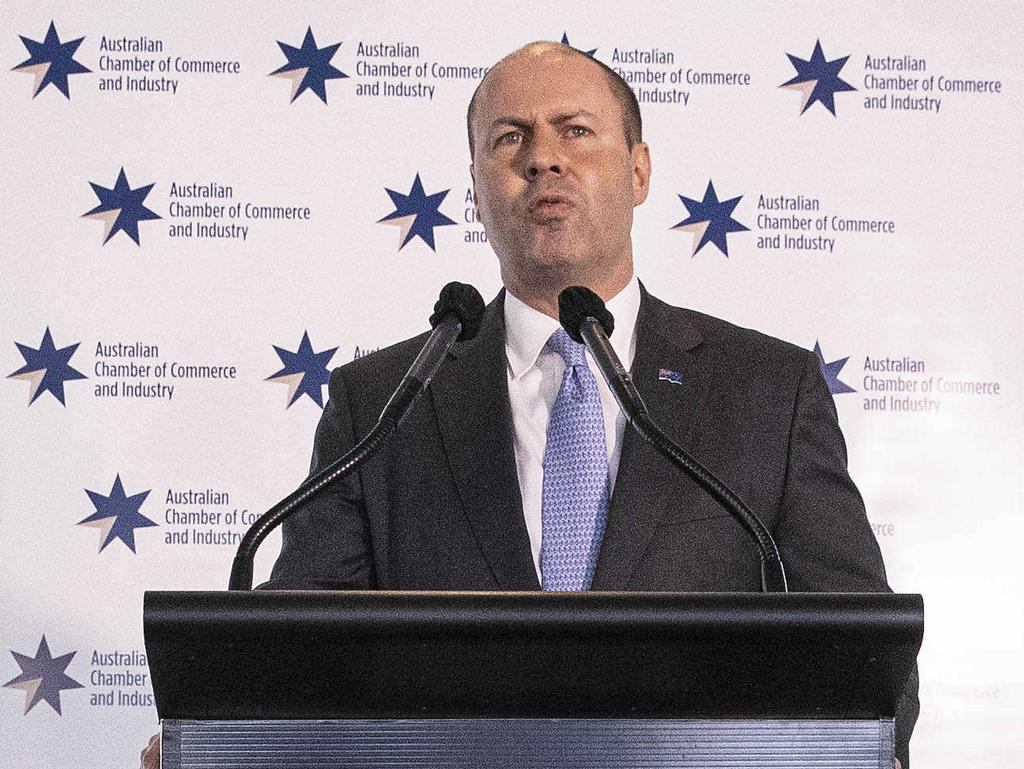Federal budget: Josh Frydenberg, Mathias Cormann reveal ‘challenging’ deficit figures
Final position of the federal budget after 2019/20 financial year has deficit hitting $85.3bn and gross debt increasing to $684.3bn.
Josh Frydenberg has unveiled the final position of the federal budget after the 2019/20 financial year, with the deficit hitting $85.3bn and gross debt increasing to $684.3bn.
The Treasurer said it was important to recognise that Australia had approached the global pandemic from a position of economic strength, declaring the Australian economy is “fighting back against the virus.”
“Today’s 2019-20 final budget outcome shows a fiscal result that was broadly consistent with the economic and fiscal update the government released in July,” Mr Frydenberg said.
“The underlying cash balance was a deficit of $85.3 billion, or 4.3 per cent of GDP, compared to the forecast surplus of $5 billion, or 0.3 per cent of GDP at MYEFO.”
Mr Frydenberg said this was a half billion dollar improvement from what was estimated in terms of the deficit, but a $93 billion deterioration based on forecasts at the end of the last year.
He said Australia’s GDP fell in the June quarter by 7 per cent, which was a better result than other nations such as France, New Zealand and the United Kingdom.
Mr Frydenberg said that Australia’s economy had approached the pandemic from a position of economic strength.
“Unemployment had fallen to 5.1 per cent in February, down from 5.7 per cent when we came to government,” he said.
“The numbers in MYEFO showed that GDP will grow by 2.25 per cent in 19/20. And we delivered the first balanced budget in 11 years.”
Finance Minister Mathias Cormann declared the budget outcome a “challenging set of numbers”, but said the deficit was a necessary price to pay to keep Australians a float when the coronavirus hit.
Senator Cormann reiterated Mr Frydenberg’s comments that Australia was faring better because it entered the crisis from a position of economic strength, declaring it “gives us a very strong foundation from which to rebuild.”
“This is a challenging set of numbers, as we said then (MYEFO), but we know why we’re here,” Senator Cormann said.
“We’re here because of the economic and fiscal impact of the coronavirus pandemic, we’re here because of the cost of the fiscal support, we necessarily had to provide to our health system to the economy, to businesses, to working Australians and to those Australians who lost their job through no fault of their own, as a result of this pandemic.”
Senator Cormann said the government had a clear plan to facilitate a strong economic and jobs recovery, while also repairing the budget.
“The budget on October 6 will provide the next instalment of our plan to help ensure that happens,” Senator Cormann said. “Despite all of the challenges that we’re facing as a nation, and despite the challenging set of numbers we’re formally reporting today in this final budget outcome, Australia remains in a better, stronger more resilient position than just about any other country in the world.”
Mr Frydenberg said the Morrison government did not have the luxury that previous governments and banks had in terms of reducing cash rates, but said he will rely on monetary policy to provide economic stimulus.
Asked if low interest rates were putting pressure on the government to extend fiscal support, the Treasurer said fiscal policy was still “the main game in town.”
He said the Reserve Bank had played a key role in different ways during the COVID-19 crisis, including injecting $75 billion of liquidity into the banking system, providing a stable financial system through this crisis and purchasing $60bn of bonds.
“That’s an important role for the Reserve Bank to play in terms of targeting the yield for the 3-year bond rate at 25 basis points and so the monetary policy is working in different ways than it has in previous crises.”
Mr Frydenberg said the October budget would show how important fiscal policy is.
“Whether it’s bringing forward infrastructure spending or encouraging business investments to boost aggregate demand to get people in work, and we’ve made significant announcements in the last two days, around the flow of credit and the responsible lending laws around insolvency reform changes, both of which don’t hit the budget bottom line, but both of which help create jobs and be an important part of our recovery.”
Asked if the nation could afford to take the JobSeeker payment away given the need for economic stimulus, Mr Frydenberg said the Morrison government had “doubled” the safety net.
The Treasurer flagged the government would make a decision later this year about extending its wage subsidy packages, declaring “we’re leaning in on continuing to provide support and provide support.”
On Friday Australians on the JobSeeker payment and those on full-time JobKeeper payments will lose $300 a fortnight.
Those on part-time JobKeeper payments will see $750 less in their bank accounts each fortnight.
“We doubled the safety net going into this crisis, with the $550 JobSeeker coronavirus supplement,” Mr Frydenberg said. “Now, that’s transitioning down, just as the JobKeeper payment is transitioning down, from $550 to $250.”
Mr Frydenberg said the government had many initiatives that would rollout following the budget and would boost aggregate demand, put money into the economy, increase spending and economic activity and create jobs.








To join the conversation, please log in. Don't have an account? Register
Join the conversation, you are commenting as Logout